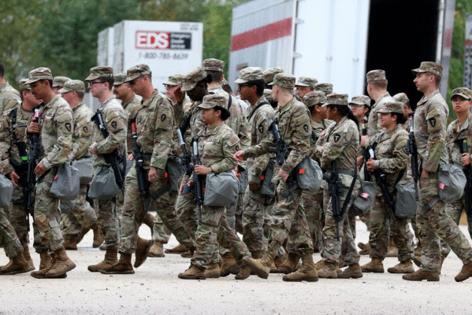'We will not wait': Judge wants lawsuit over National Guard deployment in Illinois to proceed as Supreme Court decision looms
Published in News & Features
CHICAGO — A federal judge in Chicago on Wednesday said she will not wait for the U.S. Supreme Court to weigh in before deciding how to proceed on her restraining order barring President Donald Trump from deploying National Guard troops to Illinois.
At a status hearing before U.S. District Judge April Perry, both sides said they had agreed to at least a 30-day extension of Perry’s order. But they disagreed on how to proceed while the Supreme Court decides whether to grant a stay, with lawyers for the government saying they’d prefer to wait before beginning the process of sharing discovery.
Department of Justice attorney Jody Lowenstein also noted the same legal team defending this case has a trial over similar issues starting in Oregon next week.
Christopher Wells, meanwhile, an attorney for the Illinois attorney general’s office, said their preferred approach is to “figure out an accelerated path” to having a trial on the merits.
“We do not want any lapse in the court’s temporary restraining order before there is any injunction in place,” Wells said.
Perry said she was happy to consider "anything” but told the parties to talk among themselves and come back at 3 p.m. with a final proposal. Among the options: hold a full hearing on a preliminary injunction in November, ask for expedited briefing on summary judgment, or allow the case to proceed on a more normal track, which could take many months.
“(The Supreme Court) could very well rule today, they could also wait a week,” Perry told the parties in the telephone hearing.
“The problem with waiting is, every day we wait for them, you are losing time” to prepare for a trial, Perry said. “So we will not wait. If they rule today, we may have to reset the schedule tomorrow.”
Despite the time crunch, Perry said it was important to get it right given the issues at stake.
“It does make sense to me that we take a deliberative approach here,” the judge said. “These are complicated legal issues that have not been explored by the courts above us in a very long time.”
Perry’s temporary restraining order barring National Guard troop deployment in Illinois was issued Oct. 9 and expires Thursday, though there undoubtedly will be some sort of extension, whether it’s the 30 days offered by both parties or a longer period to allow for a trial.
In its filing last week asking the Supreme Court to issue a stay on Perry’s order, the Trump administration called it part of a “disturbing and recurring pattern” that “improperly impinges on the President’s authority and needlessly endangers federal personnel and property.”
It asked that President Donald Trump be allowed to deploy some 700 troops in Illinois — 300 from the Illinois National Guard and another 400 federalized out of Texas earlier this month.
In the 46-page response, the state said it would be inappropriate for the high court to get involved at this stage in the proceedings, where a district court’s decision has yet to be decided on appeal.
The filing also said lawyers for Trump offered “no meaningful response” to the factual basis for U.S. District Judge April Perry’s Oct. 9 temporary restraining order, adding that declarations submitted by a series of immigration officials outlining purported violence against agents and out-of-control protests simply did not hold water.
“In fact, applicants do not even attempt to rebut that much of the activity the declarants complained about was constitutionally protected,” the state response stated.
The Supreme Court fight is playing out on an unusually fast track, with Trump appealing just a day after the 7th U.S. Circuit Court of Appeals declined to grant a stay to Perry’s order, ruling her findings were not “clearly erroneous” and that “the facts do not justify” Trump’s actions in Illinois.
The three-judge appellate panel unanimously agreed with Perry that, even giving the president “great deference” when it comes to his power to call up the military, there was no evidence that he needed troops to help enforce immigration law or quell any kind of organized rebellion.
“The spirited, sustained, and occasionally violent actions of demonstrators in protest of the federal government immigration policies and actions, without more, does not give rise to a danger of rebellion against the government’s authority,” stated the opinion by Judges Ilana Rovner, David Hamilton and Amy St. Eve.
The judges went on to note that while the Trump administration has claimed that protesters and local politicians are hampering immigration-enforcement efforts, the evidence — and even the administration’s own statements — don’t back that up.
_____
©2025 Chicago Tribune. Visit chicagotribune.com. Distributed by Tribune Content Agency, LLC.







Comments